- New National Directors
- Academy award winner
- New digital tools for St. James’s Hospital
- Green Award Win
- Irish hospital wins international award
- A new form of leadership
- Minister’s decision welcomed
- National Centre for Stereotactic Radiosurgery
- Design team sought for new hospital
- Cross border health services
- New Chair for HIQA
New National Directors
The HSE has appointed five new National Directors and a new Chief Financial Officer, following a confined Public Appointments Service competition.
Their appointment will be on an initial designate basis pending the enactment of the new HSE Governance legislation, when they will take up their posts for a term of three years.

Mr. Ian Carter has been appointed National Director of Acute Hospitals. He is a former Chief Executive Officer with St James’s Hospital in Dublin. He held this post from 2006 until 2012. Previously he was Deputy CEO at the hospital from 1997 until 2006. Prior to taking up his new role of National Director of Acute Hospitals he was on secondment to the HSE as Special Projects Manager. He has also held the position of Assistant CEO (Acute Hospitals) Mid Western Health Board (1997) and General Manager (Acute Hospitals) Mid Western Health Board (1993 – 1997).
From 1997 to 2003 Mr.Carter was Associate Lecturer with the National College of Ireland (NCI). He is currently Adjunct Associate Professor TCD.
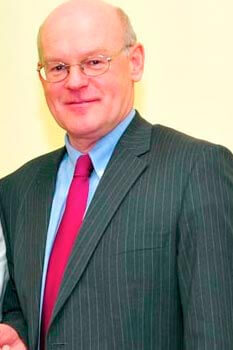
Mr. John Hennessy has been appointed National Director of Primary Care. The new post of National Director of Primary Care is one of a number of new posts established to complete the HSE’s new Directorate Management and Leadership Team. He has almost 30 years of health service experience in senior management and frontline roles. Over the past three years he has worked as Regional Director of Operations where he led and managed health services across the nine counties of the West region.
He played a lead role in the substantial reorganisation of health services in the West over the past decade, including the Mid West hospital services and the Galway Roscommon hospital group. He has also been involved in ongoing quality improvement initiatives in the health service including the preparation of services for accreditation and licensing and the registration of HSE long term residential services. He holds a degree in health management.

Mr. Stephen Mulvany has been appointed National Director of Mental Health. He is a very experienced senior manager in the health system and was appointed Regional Director of Operations (Dublin North East) in October 2009 where he had full responsibility for all health and social care services delivered in Dublin City and County north of the Liffey, Louth, Meath, Cavan and Monaghan. As Regional Director of Operations (RDO) he was a member of the HSE National Management Team chaired by the CEO.
As RDO his role, which covered a population of just over one million, replaced three former senior operational manager roles which previously had full authority and responsibility for all publicly funded hospital and community services in Dublin North East including Mental Health, Primary Care, Disabilities, Elderly Services, Palliative Care and Social Inclusion.
Prior to this role he was Hospital Network Manager for all hospitals in the Dublin North East region in addition to being Programme Manager for the HSE’s North East Transformation Programme. Previously he was Assistant National Director of Finance with responsibility for the HSE Dublin North East region following the establishment of the HSE in January 2005 and prior to that he was Director of Finance of the former Northern Area Health Board. He is currently the interim National Director of Finance for the HSE, a role he took up in March this year pending the appointment of the new Chief Financial Officer.
He is a Chartered Accountant (ACCA) with a Post Graduate Diploma in Information Technology for Managers. He also previously worked as Industrial Relations Officer for the former Eastern Health Board in addition to ICT related roles.
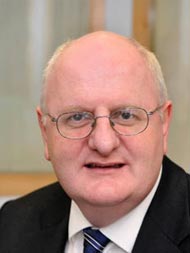
Mr. Pat Healy has been appointed National Director of Social Care. With more than 20 years of management experience in the health service, he has worked in a number of senior management roles delivering health and personal social services across the South of the country. These involve services to the more than one million people who live in the HSE South area of Wexford, Carlow, Kilkenny, South Tipperary, Waterford, Cork and Kerry.
Most recently as the Regional Director of Operations for HSE South, he has been accountable for all health and personal social services, community and acute hospitals, primary care, elderly, disability and mental health services.
He has led the team in HSE South in delivering significant reorganisation of the Acute Hospital services, implementation of Vision for Change within the Mental Health service as well significant development of the Older People and Primary Care services in the region. He previously worked as Assistant National Director for HSE South when he played a lead role nationally in the development of Services for Older People and Social Inclusion Services aimed at ensuring equity of service for those who are disadvantaged. A former Director of Disability Services and later General Manager for West Cork, he became Programme Manager for community services in Cork and Kerry in 2002; going on to become Chief Officer for the health services in Cork and Kerry in 2005. Prior to joining the Health Service, he worked for Cork City Council

Dr. Stephanie O’Keeffe has been appointed National Director for Health & Wellbeing. She is a social psychologist and has worked for the past 12 years in the health sector. She has specific expertise in national health strategy implementation, research and evaluation and change management. She has been responsible for the implementation of four national strategies in the health area.
Most recently she was the Director of a new Health and Wellbeing Programme in the Department of Health. She was responsible for leading the development and coordinating the implementation of Ireland’s first intersectoral population health framework, Healthy Ireland. Dr. O’Keeffe’s new role will involve leading a new and emergent Health and Wellbeing Directorate in the health service. This Directorate is directly responsible for implementing and leading on many of the actions in Healthy Ireland.
Prior to working in the Department of Health, Dr. O’Keeffe worked for a short time as Director of the National Office for Suicide Prevention.
She is a former Director of the Crisis Pregnancy Agency where she worked for ten years. Prior to becoming Director in 2010 she worked as Assistant Director and as a Research and Policy Manager. She completed a Bachelors Degree in Psychology in Trinity College, Dublin, in 1996, an MSc in Psychological Research Methods and Assessment in University of Surrey, UK, in 1988 and a PhD in organisational decision making from the University of Surrey, UK, in 2003.

Mr. Thomas Byrne has been appointed Chief Financial Officer. He is a former Director and Chief Finance Officer of BT Ireland. He has also held the position of Vice President Finance with BT Global Services.
Educated at Belvedere College, he is a graduate of Trinity College Dublin and is a past president and trustee of the Trinity Business Alumni and former President of the Chartered Institute of Management Accountants in Ireland (CIMA).
He has recently completed a PPP role in Project Finance with Irish Rail. He has served as a board member of a number of companies and charities including Co-Operation Ireland, the US Ireland Alliance and Bus Eireann and is currently a Board Member of the BT Young Science and Technology Exhibition and other charities.
He has previously held the role of CFO with Bristol Myers Squibb in Ireland and senior finance roles with Smurfit Ireland. He is a Non Executive Director of Thompson Life and Pensions Ltd. and Thompson Insurances Ltd and intends to resign from these Boards. He sits on the Finance and Risk Committee of the Royal Dublin Society.
Academy award winner
The HSE National Productive Ward has won the UK ‘Annual Lean Healthcare Academy’ International Award.
The overall objective of the Productive Ward: Releasing Time to Care programme is to enable nurses and other hospital staff to spend more time with patients, thereby improving the safety and efficiency of the ward.
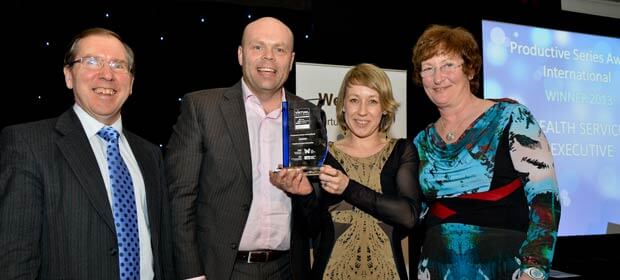
The HSE said the programme achieves this by empowering ward teams to identify areas for improvement and giving staff the information, skills and time they need to regain control of their ward and the care they provide. They do this by looking at processes such as drugs rounds, ward rounds and discharges, and then finding ways of streamlining these processes so that the ward staff can spend more time on direct patient care.
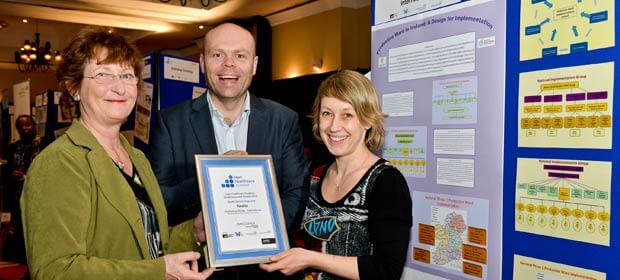
The HSE joined this now global initiative in December 2010 when the Office of the Nursing and Midwifery Services Director established a national advisory group to examine a method for national implementation. Phase 1 sites were recruited in the Autumn of 2011 and commenced the modular improvement work in January 2012. Phase 2 sites were recruited in Autumn 2012 and commenced their modular improvement work in January 2013.
Mr. Mark White, Director of the NMPD (Nursing Midwifery Planning Development) in the HSE is the national Clinical Lead.

The Programme is operating in two phases in the following hospitals:
|
Phase 1 Productive Ward Sites and Wards |
Phase 2 Productive Ward Sites |
|
|---|---|---|
|
HSE WEST |
Letterkenny General Hospital | Nenagh General Hospital (2 wards) |
| Manorhamilton – Our Lady’s Hospital | Galway University Hospital (2 wards) | |
| Mid West Regional Hospital, Ennis (2 wards) | ||
| Roscommon County Hospital (2 wards) | ||
| Sligo General Hospital | ||
| St. John’s Hospital Limerick | ||
|
HSE DML |
Coombe Women and Infants Hospital | National Rehabilitation Hospital, Dun-Laoghaire |
| Midland Regional Hospital Tullamore | St. Vincent’s University Hospital | |
| Midland Regional Hospital Portlaoise | Peamount Hospital, Newcastle, Co. Dublin | |
| St. Vincent’s University Hospital (2 wards) | ||
|
HSE DNE |
Beaumont Hospital | Beaumont Hospital(2 wards) |
| Connolly Hospital | Connolly Hospital(1 ward) | |
| Our Lady of Lourdes Drogheda (2 wards) | Our Lady of Lourdes Drogheda (2 wards) | |
| Rotunda Hospital | Our Lady’s Navan | |
|
HSE SOUTH |
Cork University Maternity Hospital | Mercy Hospital, Cork |
| South Infirmary Victoria University Hospital | Macroom Community Hospital | |
| South Tipperary General Hospital (2 wards) | ||
| Waterford Regional Hospital |
The criteria for judging the award were:
- Use of Lean tools and techniques throughout the project
- Clearly defined aims and objectives for the project
- Positive outcomes for both staff and service users
- Evidence of staff involvement
- Demonstration of quantitative improvements
- Evaluation of qualitative improvements
- Evidence to demonstrate sustainability over time
- Patient-centred approaches
- Relevance to category
New digital tools for St. James’s Hospital
The first company to receive funding under the Connected Health project run by The Digital Hub and St. James’s Hospital is Esri Ireland, a software and services organisation, specialising in the application of geographical information systems.
Esri Ireland will receive seed funding, free office space and enterprise development supports through Connected Health. In return, over the coming months, the company will develop a number of digital tools for St. James’s Hospital.
Connected Health was launched by The Digital Hub and St. James’s Hospital earlier this year, with the aim of supporting digital technology companies to develop solutions to healthcare challenges. The first call for proposals focused on local asset mapping. Digital enterprises were invited to submit applications outlining how they would develop a website and mobile app using local data to document all health-related services in the vicinity of St. James’s Hospital.
Esri Ireland is beginning working with clinicians from St. James’s Hospital immediately to develop the new website and mobile mapping platform.
Esri Ireland will also provide geographical information systems specialists to work with the hospital to configure and customise the web-based and mobile applications to work with a predetermined taxonomy of health assets in the local catchment area.
The new tools developed by Esri Ireland are expected to be unveiled in the coming months and, ultimately, will play an integral role in LAMP (the Local Asset Mapping Project), an ambitious preventative healthcare project, currently underway at St. James’s.
The LAMP project, on which Esri Ireland will work, aims to create a map of all services and amenities in the area surrounding St. James’s Hospital which impact directly or indirectly on health. This map will be used as a service design and research tool for St. James’s, enabling it to better understand and support health and wellness in the local community. The map will be made available online as a resource for the community.
Commenting today, Dr. Stephen Brennan, Chief Strategy Officer with the Digital Hub Development Agency (DHDA), said: “Connected Health is unique because healthcare professionals are – and will continue to be – directly involved in the solution development. Clinicians at St. James’s have identified healthcare challenges that could potentially be resolved through the development of new digital solutions.
“This means that companies that successfully apply to Connected Health have the chance to develop products for which a real-world market has already been defined. Before they even begin work, they know that a demand for their product exists. In today’s competitive marketplace, this is a huge advantage for digital entrepreneurs.”
Commenting today, Dr. Gerard Boyle, Principal Physicist at St. James’s, said: “Health technology is no longer just about tools for the treatment and diagnosis of disease in a clinical setting. Increasingly, potential applications for technology to support health and wellness in the community are emerging. We are delighted to be working with Esri Ireland to explore the potential of GIS in this area.”
The Digital Hub is an Irish government initiative aimed at creating an international centre of excellence for digital content and technology enterprises. It is located in Dublin’s south-west inner city, and is home to 66 digital enterprises, ranging from start-ups to well-established businesses that are significant employers and leaders in their fields. Since the project’s inception, 170 companies have progressed through the Hub, including some now well-established names such as Daft.ie, Havok, Houghton Mifflin (Riverdeep), Amazon and Gala Networks Europe. The Digital Hub Development Agency is the Irish state agency that manages the Digital Hub project. Further information is available at: www.thedigitalhub.com.
Green Award Win
For the third year in succession, Temple Street Children’s University Hospital has won an award at the Green Awards Ceremony.

The hospital won the Green Transport Award and Fergus Ashe, Allied Services Manager accepted the award on behalf of the hospital.
TSCUH CEO, Mona Baker congratulated Fergus and the Allied Services Department who run the hospital’s commuter centre Travelways and to Vinny (Ervin Vucaj) who administers the Taxsaver and Cycle to Work Schemes.
She also congratulated all the staff of the hospital who have switched to alternative modes of transport and who are now, walking, running, cycling or taking the train, Dublin Bus, Bus Eireann, Matthews, Wexford Bus, Luas, Dart etc. Many staff have availed of the Taxsaver and Bicycle to Work Incentive Schemes.
“The Travelways Commuter Centre last year processed almost €300k of ticket and bicycle sales. Ninety four staff purchased bicycles last year, an increase of 30% on the previous year. Staff by moving to alternative modes of transport and away from cars have reduced the hospital’s carbon footprint and saved a minimum of 325,000 kgs of CO2 in the last year. Other initiatives such as redevelopment of the hospital appointment card with Healthcare Records and the Development Office’s initiative with Q-Park on the provision of alternative parking at an affordable rate for parents/guardians visitors and staff of Temple Street helped the hospital to win this prestigious award.
“As we constantly strive to improve our standards within the hospital across all departments, this award is a great testament to the hard work and commitment of the team and all the staff of the hospital.”
Irish hospital wins international award
Cappagh National Orthopaedic Hospital in Dublin has won a major international quality improvement award.
The hospital was awarded the 2013 CHKS Top Hospitals Quality Improvement Award at a recent ceremony in Middle Temple Hall in London.
The international award recognises significant improvements in patient care and patient experience as well as staff welfare, safety and morale.
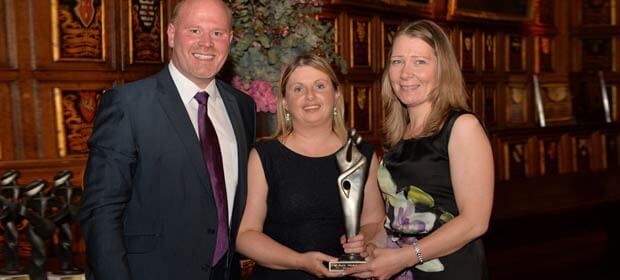
The CHKS Quality Improvement Award 2013 was open to all healthcare organisations accredited by CHKS in 2012.
Having reviewed the submissions from the healthcare organisations the CHKS awards panel shortlisted five organisations:
- Cappagh National Orthopaedic Hospital
- ASL4, Italy
- Cahercalla Community Hospital Ennis, Co. Clare
- The New Victoria Hospital, UK
- Ygia Polyclinic, Cyprus
All shortlisted organisations were highly commended by the judges with Ygia polyclinic declared runners-up.
Mr. Gordon Dunne, Chief Executive of Cappagh said: “Cappagh was the first public hospital to be externally accredited in Ireland over a decade ago. Every staff member past and present, have been committed to the quality improvement agenda since the commencing on the accreditation pathway. This is a validation of their efforts in ensuring the patient is at the centre of all we do at Cappagh”
Professor John O’Byrne, Chair of the Medical Board of Cappagh said that this prestigious international award is a result of the huge commitment and effort by every member of the staff at Cappagh Hospital both clinical and non-clinical. It reflects a determination to deliver the highest quality of care to our patients.
Since 2001, CHKS has been recognising and rewarding significant achievements in quality and improvement in healthcare through the Top Hospitals Programme awards. These awards celebrate the success of healthcare providers across the UK and internationally. Their independence and analytical rigour means that all of the Top Hospital Programme awards are considered a significant coup for winning trusts and hospitals.
CHKS Ltd is part of Capita plc, it is one of the leading international independent providers of healthcare intelligence and quality improvement services to the NHS and independent healthcare sector. With over 20 years’ experience and having worked with over 300 clients worldwide, CHKS has a portfolio of information products, internationally-recognised accreditation programmes and consultancy services which provide clinicians and managers with the information needed to drive improvements inpatient care, financial efficiency, clinical effectiveness and quality.
Amongst the other honours awarded on the night were three national (UK) awards for patient safety, data quality and quality of care, based on the evaluation of 22 key performance indicators covering safety, clinical effectiveness, health outcomes, efficiency, patient experience and quality of care.
A new form of leadership

Leadership, as we know it, is coming to an end and a new form is now beginning to emerge. Professor John Burgoyne, Professor of Management and Learning at Lancaster University’s School of Management said when he addressed the RCSI Institute of Leadership.
He said that to date, leadership had been too much about ‘human relations’, missions, visions and empowerment, and not enough about the analytics.
“A significant cause of the credit crunch occurred because of the neglecting of the scientific spotting of the ‘rotten apples’ in the sub-prime mortgage boxes and other areas of business. But now, new work trends are emerging and moving towards a more scientific version of leadership.”
Prof. Burgoyne has done a lot of work with the NHS and has looked at ways of evaluating leadership and processes in order to make the system more effective.
His research interests include the learning organisation; corporate management development; the nature of management, knowledge and competence; theories of learning and teaching, and training and development methods.
Minister’s decision welcomed
The Irish College of Ophthalmologists (ICO) has welcomed the decision by the Minister for Health, Dr. James Reilly, to rescind the order to destroy more than one million Guthrie heel-prick card files taken from newborns in Ireland between 1984 and 2002.
The Minister’s decision to convene an expert group to re-examine the options of how the cards can be archived in order to comply with data protection laws and protect patient privacy has been broadly welcomed by the medical community.
The heel prick blood test is used to check for a number of genetic conditions, including Phenylketonuria (PKU), Cystic Fibrosis, Hypothyroidism, MCADD and Sickle Cell diseases.
Speaking in relation to the importance of preserving the files, Ms. Patricia Logan, President of the ICO, said, “Upwards of twenty eight metabolic disorders can be checked for with this test and for the future, this heel prick test will in fact be applicable to a lot of other conditions and indeed is used in other countries for more than the conditions listed above.
“The data contained in these files are invaluable in terms of the study of patterns, cause and effects of health and disease conditions in a defined population. It is highly probably the information contained in these records will lead to future advances to deal with existing and indeed new syndromes in the future. If destroyed, there will be regret in the future when the need arises to look back at the incidence of disease in the Irish population.”
Acknowledging the data protection issue, Ms. Logan added, “The College is cognisant of the patient privacy dilemma facing the Minister and expert group in relation to this decision. However, we urge that every effort is made to preserve these precious medical files and that an alternative method be devised to ensure retention for clinical and medical research.”
National Centre for Stereotactic Radiosurgery
Health Minister, Dr. James Reilly, T.D., has officially launched the new National Stereotactic Radiosurgery Service at the St Luke’s Radiation Oncology Unit at Beaumont Hospital, Dublin
This new service is designed to treat patients with cancerous and benign brain tumours as well as cancers in other parts of the body and is one of the most sophisticated and precise radiotherapy treatments currently available internationally.

Funded by the Friends of St Luke’s, this new state of the art treatment was developed in partnership with the St Luke’s Radiation Oncology Network, the National Cancer Control Programme and the National Neurosurgical Centre at Beaumont Hospital. Its addition will establish the Beaumont facility as the National Centre for Stereotactic Radiosurgery in Ireland.
The new service will further enhance the current stereotactic service in St. Luke’s Hospital, Rathgar. Up to 100 patients are expected to benefit from the treatment in Beaumont this year, with that number increasing to around 200 annually over the coming years as the service develops. It will also mean that patients will no longer have to travel abroad for this particular treatment.
Involving an investment of €1m by the Friends of St. Luke’s, the new treatment significantly improves the patient experience. It is more precise, less intrusive and provides more patient comfort compared with older systems that required immobilisation of the patient’s head in a metal frame.
Speaking at the launch, Dr. David Fitzpatrick, Consultant Radiation Oncologist, St. Luke’s Radiation Oncology Network said “This will allow our patients to benefit from a new standard of radiotherapy treatment – one that delivers fast, precise and less invasive treatment. The speed at which we can treat patients – in as little as 20 minutes – will mean many more patients can access world leading cancer treatment in Ireland.”
According to Mr. Mohsen Javadpour, Consultant Neurosurgeon at the National Neurosurgical Centre Beaumont: “This new equipment, provided by Novalis, allows us to target difficult to treat cancers, such as inoperable tumours deep in the brain where open surgery carries a high risk. It enables us to treat the tumour whilst protecting the nearby healthy tissue. The recovery time is much shorter compared to open surgery and most treatments can be performed as a day case procedure.”
Design team sought for new hospital
A tender notice for the design team for the new National Paediatric Hospital is due to be published in June and Health Minister, Dr. James Reilly, T.D. is to re-structure the interim National Paediatric Development Board on a permanent basis to manage the project.
While much of the work that had been done for the project on its previous location on the Mater campus could be transferred to the new site, a new design will be required.
The Minister said a joint group of the HSE and St. James’s Hospital is meeting regularly to progress the enabling and decant work required, while a shared services group has been established to focus on identifying the facilities which can be shared to optimise the build.
Cross border health services
Health Minister, Dr. James Reilly, T.D., and Northern Ireland’s Health Minister Edwin Poots have said they are anxious to progress further developments which would facilitate bi-directional cross border flows in acute services including ED care and planned elective procedures.
When they met in Dundalk this month, Dr. Reilly said the work undertaken by CAWT was an example of what could be achieved through effective cross border cooperation.
“I am looking forward to working with Minister Poots in developing and delivering high quality care and treatment services to those who reside in the border regions. Our departments have been working together on a range of services including the provision of paediatric cardiac surgery on an all island basis. We’re also looking at the provision of cardiac services in the north west of the island. Such a provision will be hugely beneficial to patients on both sides of the border.”
Both Ministers heard about a border region alcohol project aiming to reduce the effects of harmful drinking. Its early intervention service focuses on the provision of alcohol screening and intervention training to key practitioners in the mental health/family support area.
Health Minister Edwin Poots said: “Preventing and addressing the harm related to alcohol and drug misuse is a key priority for my department and I welcome the establishment of the North/South Alcohol Forum established to provide a mechanism to drive forward and co-ordinate work on these issues and, in particular, the potential to introduce minimum unit pricing for alcohol. I am keen to ensure both jurisdictions can get the greatest impact from this invaluable work.”
The Ministers also listened to participants of the CAWT Social Inclusion Project which is focused on reducing health inequalities for specific groups like vulnerable women and travellers.
Dr. Reilly said reducing health inequalities was a key priority for his department. “Significant health inequality gaps continue to exist in terms of life expectancy, drug related and alcohol related mortality and suicide. Inequalities in population health are related to inequalities in society – this should not be the case.”
“While we face many of the same health challenges it is important that we share ideas and co-operate to address these. I look forward to strengthening relationships further for the mutual benefit of people on both sides of the border and to ensuring that both jurisdictions continue to benefit from such co-operation.”
Both Ministers went to the Louth County Hospital to hear about the progress of the CAWT GUM clinics in cross border areas. The clinics, established with EU funding, have successfully treated over 5,600 people and trained almost 2,000 in sexual health promotion. They provide rapid access to specialist diagnostic, preventative and curative services to people with sexually transmitted infections.
New Chair for HIQA

Mr. Brian McEnery, partner with BDO Consulting has been appointed as the new Chairperson of HIQA by Health Minister, Dr. James Reilly, T. D. He succeeds Mr. Pat McGrath, who has been Chair of HIQA for the last six years.
Mr. McEnery is lead partner in healthcare consulting at BDO. Since March 2012, he has been dealing particularly with older people, primary care and acute care. For the previous nine years he was responsible for the financial management of the corporate finance and restructuring area of the firm.
He is a member of the Board of NAMA and chairs its audit committee. He is a former Chair and President of the Association of Chartered Certified Accountants and a member of its Global Council.

